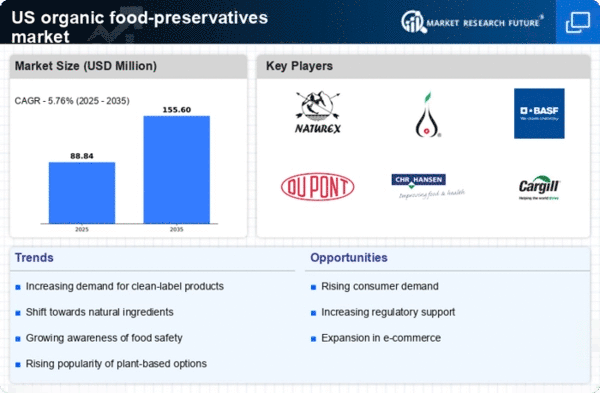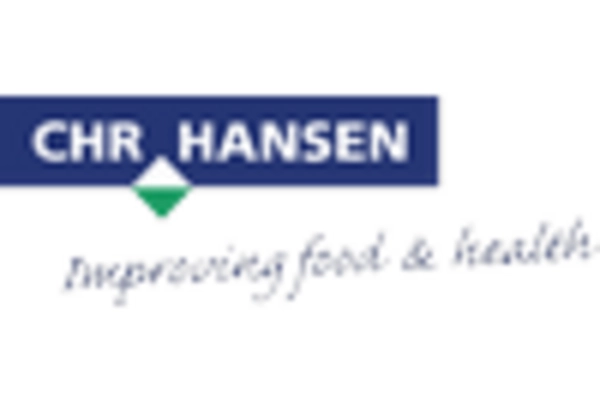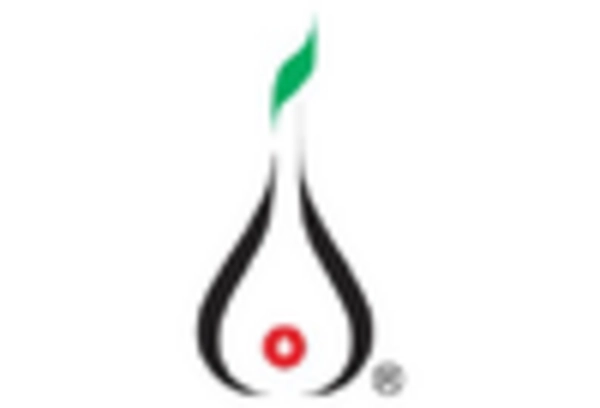Rising Health Consciousness
The increasing awareness of health and wellness among consumers is a pivotal driver for the organic food-preservatives market. As individuals become more informed about the adverse effects of synthetic additives, there is a marked shift towards organic alternatives. This trend is reflected in market data, indicating that the organic food sector has experienced a growth rate of approximately 10% annually. Consumers are actively seeking products that align with their health goals, leading to a surge in demand for organic preservatives. This heightened focus on health is not merely a passing trend; it appears to be a fundamental shift in consumer behavior, thereby propelling the organic food-preservatives market forward.
Consumer Demand for Transparency
The demand for transparency in food labeling is a crucial driver for the organic food-preservatives market. Consumers are increasingly scrutinizing ingredient lists and seeking products that are free from artificial additives. This trend is underscored by a survey indicating that over 70% of consumers prefer products with clear, understandable labels. As a result, manufacturers are compelled to reformulate their products to meet these expectations, leading to a rise in the use of organic preservatives. This shift not only enhances product appeal but also aligns with the broader movement towards clean eating, thereby fostering growth in the organic food-preservatives market.
Regulatory Support for Organic Products
Government regulations and policies that favor organic products significantly influence the organic food-preservatives market. In the US, initiatives aimed at promoting organic farming and food production have created a favorable environment for organic preservatives. The USDA's National Organic Program has established standards that encourage the use of organic ingredients, which in turn boosts consumer confidence. As a result, the organic food-preservatives market is likely to benefit from increased visibility and acceptance among consumers. Furthermore, the financial support provided to organic farmers enhances the supply chain, making organic preservatives more accessible and affordable, thus stimulating market growth.
Sustainability Trends in Food Production
The growing emphasis on sustainability within the food industry is a significant driver for the organic food-preservatives market. Consumers are increasingly concerned about the environmental impact of their food choices, leading to a preference for products that are sustainably sourced. This trend is reflected in market data, which shows that sales of organic products have risen by 12% in recent years, driven by eco-conscious consumers. As a result, manufacturers are prioritizing organic preservatives that align with sustainable practices, thereby enhancing their market appeal. This alignment with sustainability not only meets consumer demand but also positions the organic food-preservatives market favorably in an increasingly eco-aware marketplace.
Innovation in Organic Preservation Methods
Technological advancements in preservation methods are reshaping the organic food-preservatives market. Innovations such as high-pressure processing and natural fermentation techniques are gaining traction, allowing for the development of more effective organic preservatives. These methods not only extend shelf life but also maintain the nutritional quality of food products. Market analysis suggests that the adoption of these innovative techniques could lead to a 15% increase in the availability of organic preserved foods. As consumers continue to seek healthier options, the integration of advanced preservation methods is likely to play a pivotal role in the expansion of the organic food-preservatives market.

















